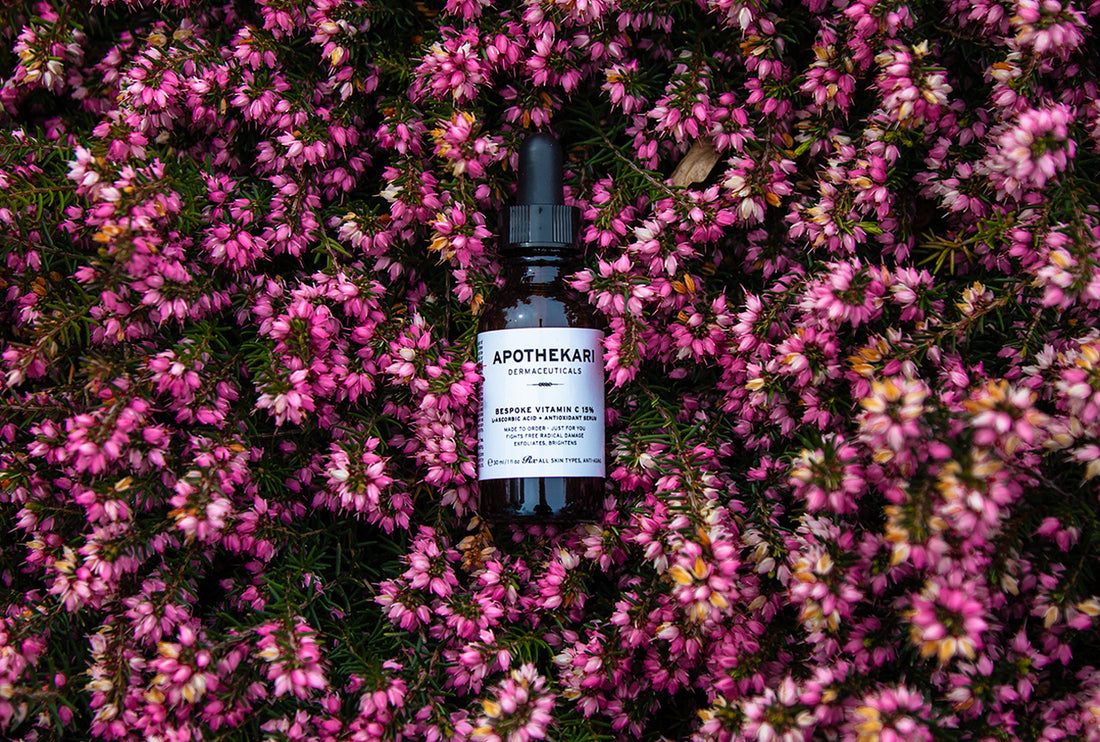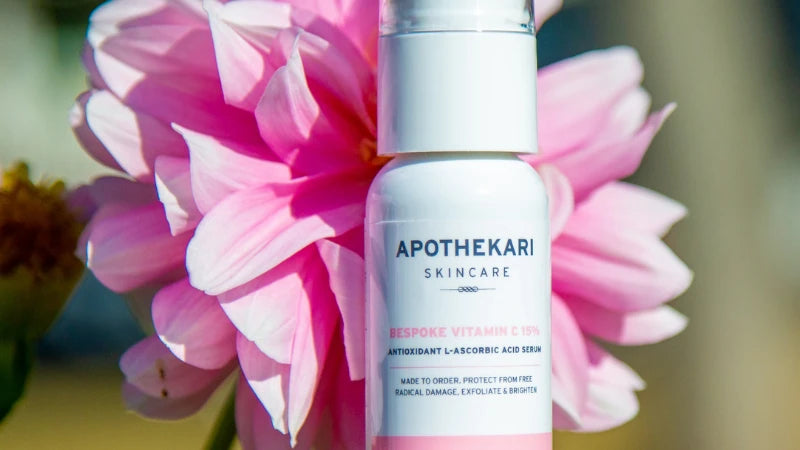Blog
How to Choose the Best Vitamin C Serum for Your Face
What is Vitamin C? If you’re serious about skincare, you likely know that vitamin C (as found in our Bespoke Vitamin C 15% Serum) is a must have in your routine and in this post, let’s help you find the best vitamin c serum for your face. Buy Bespoke Vitamin C 15% Serum Vitamin C belongs to a group of molecules known as antioxidants, substances which stop oxidation, a chemical reaction that results in the production of free radicals. Often referred to as ROS – reactive oxygen species – free radicals are harmful substances which can damage cells. The sun’s UV rays, pollution and cigarette smoke are some of the biggest contributors to the development of free radicals. Antioxidants like vitamin C are able to protect against free radical damage by donating one of their electrons to stop the chain reaction that results in damage. They do this without making themselves unstable. Damaged proteins, lipids and DNA in skin accelerate the aging process resulting in a change in skin structure. They can also trigger inflammation, leading to a breakdown of collagen. The end result? More wrinkles, fine lines, hyperpigmentation, saggier skin along with some types of skin cancer. Why You Need a Vitamin C Serum Our bodies manufacture some antioxidants, which deliver a range of body-wide benefits, but vitamin C isn’t one of them. In order to obtain adequate amounts of Vitamin C, it’s important to consume foods like fruits and vegetable (citrus fruits, guavas, bell peppers and kiwi fruit contain high amounts), which are rich in this important vitamin. Vitamin C is involved in many bodily processes: Collagen production Neurotransmitter production Plays a role in protein metabolism Assists with wound healing. Its antioxidant properties help limit the damage caused by free radicals and may help to prevent the development of certain diseases including cancer. A lack of vitamin C leads to scurvy, that condition experienced by sailors on long sea voyages in the mid-19th century. Vitamin C Skin Benefits Vitamin C is a normal part of the skin’s makeup, but aging causes a decline. Excessive exposure to UV light, pollution (including smoke and ozone) can also lower the skin’s Vitamin C content. While skin benefits from a vitamin C rich diet, skin care experts agree that topical application is the most efficient way to get good concentrations to skin where it helps in several ways: Limits damage caused by UV rays Contributes to collagen synthesis which helps to support skin Increases skin hydration. Studies suggest that vitamin C helps skin retain moisture by reducing transepidermal water loss (TEWL). Additionally, it may promote the synthesis of lipids, which helps to further protect against dryness. Skin Lightening/Brightening. Vitamin C reduces the production of melanin, which can help to lighten and brighten skin tone. How to Choose the Best Vitamin C Serum for Your Face L-ascorbic acid is the form of Vitamin C that has the most research to back up its skin benefits, but many other effective forms of Vitamin C are available as well. This includes ascorbyl glucoside, amino ascorbyl phosphate, sodium ascorbyl phosphate, tetrahexyldecyl ascorbate, magnesium ascorbyl phosphate, etc. All can help skin and should be evaluated individually when deciding which is the best vitamin c serum for your face. If you decide that the best vitamin C serum for your face is one that contains L-ascorbic acid, ensure that you purchase from a reputable brand. L-ascorbic acid, while highly effective, is also notoriously unstable. If a serum you are using contains this ingredient and is dark in colour or smells odd, don’t use it as it has likely oxidized and will be ineffective and potentially harmful to your skin. At Apothekari, each bottle of our L-ascorbic acid serum – Bespoke Vitamin C Serum – is made to order ensuring that every bottle is safe and effective for 6 -8 months after purchase. Vitamin C works best when combined with other antioxidants including Vitamin E, ferulic acid, green tea, resveratrol and coenzyme Q10, to name a few. Skin benefits most from formulations containing a combination of ingredients, which work together to deliver benefits. Wherever possible, Vitamin C serums should be applied in the morning prior to UV exposure as UV rays are one of the biggest generators of free radicals. Are you ready to choose the best vitamin C serum for your face?
Learn moreHow To Choose A Vitamin C Serum
If I had to make a list of my favorite skin care products, a Vitamin C Serum would get top billing. That, along with an SPF 30+ sunscreen and a retinoid treatment, would round out the list of my three must-haves. Shop Bespoke Vitamin C 15% We know Vitamin C as the vitamin that prevents scurvy, but it’s also essential to our overall health, including that of our skin. Today’s post is dedicated to this amazing, superstar ingredient. Let’s take a closer look so that you know how to find a Vitamin C serum that’s just right for you and your skin. Shop Bespoke Vitamin C 10% What Should I Look For When Choosing Vitamin C Serum? I’ve written about Vitamin C and its skin benefits before, but in this post, let’s get into the nitty gritty. While ascorbic acid/ L-ascorbic acid is the form of Vitamin C that is most well known, it is also available in several other forms. When it comes to skin care, you may find sodium ascorbyl phosphate, ascorbyl palmitate, retinyl ascorbate, tetrahexyldecyl ascorbate, magnesium ascorbyl phosphate, and ascorbyl glucoside along with others included in a range of products such as serums, lotions and moisturizers. All of these forms have skin benefits, but none compare to l-ascorbic acid when it comes to the amount of research and clinical studies to back up its use in skin care. For that reason, it’s the form of Vitamin C we love most at Apothekari and why you’ll find it included in our Bespoke Vitamin C Serums. Vitamin C is an essential nutrient involved in tissue repair and the enzymatic production of certain neurotransmitters. It is required for the optimal functioning of several enzymes and is also important for the immune system. Lastly, it functions as an antioxidant, helping to protect against free radical damage. A diet high in vitamin C can help to boost your overall wellness, but in order to get adequate concentrations to the skin, a topical treatment works best. A Vitamin C Serum can provide a range of benefits including: Evening out your skin tone by decreasing melanin synthesis associated with pigmentation Protecting skin from damage caused by pollution Improving skin hydration, and Boosting collagen production to help keep wrinkles at bay. When properly formulated, ascorbic acid helps create more youthful and firmer looking skin that looks brighter and more evenly toned. Ascorbic acid by itself is a pretty sweet ingredient but it benefits from the addition of other antioxidants who work in conjunction with it to deliver the ultimate in free radical protection. Does It Matter Which Form of Vitamin C You Use? If you’re convinced that you need to have Vitamin C in your routine, here’s how to determine if the one you’re considering is the right one for you: Look for L-ascorbic acid or ascorbic acid listed as one of the active ingredients. While it is a finicky ingredient to work with (it’s light and air sensitive), it is also delivers the biggest bang for your buck. Other derivatives do work, but none pack quite the same punch. Ensure that the ingredient is listed high up in the ingredients list to ensure you are getting a product with enough potency. Some companies disclose the concentration in their formulation and when it comes to ascorbic acid, look for at least 10%. While highly effective, L-Ascorbic Acid cannot be tolerated by some skin types. If this is the case, opt for a lower concentration (up to 10%) or seek an alternate form of Vitamin C like sodium ascorbyl phosphate, tetrahexyldecyl ascorbate or magnesium ascorbyl phosphate. They are also effective and you will see results, but they may take longer. Look for opaque packaging and if possible, an airless pump to help protect the formulation. Vitamin C benefits from other antioxidants, including other forms of vitamin C but also ingredients including green tea, vitamin e, ferulic acid, alpha lipoic acid, etc. If your Vitamin C serum contains additional ingredients as well, it’s likely to do more for your skin. Use a Vitamin C serum in the morning when it will help to protect against free radical damage that we encounter during the day. I layer it on first thing after washing or splashing my face and before I put on my sunscreen. Sunscreen plus an antioxidant like Vitamin C is a winning combination as I’ve outlined previously. It is possible to use it at night, but it may be too much for your skin used in conjunction with other treatments including a retinoid or alpha hydroxy acids. When it comes to a Vitamin C Serum, do you have a favourite?
Learn more


